By Carla Hay
NABJ Black News & Views
“The Holdovers” actress Da’Vine Joy Randolph, “American Fiction” screenwriter Cord Jefferson, and “The Last Repair Shop” co-director Kris Bowers have joined the prestigious ranks of Oscar winners.
They won their first Oscars at the 96th annual Academy Awards ceremony Sunday at the Dolby Theatre in Los Angeles. Jimmy Kimmel hosted the show, which aired on ABC.
Randolph, Jefferson, and Bowers were the only Black artists to win statuettes at the ceremony, which had 15 Black nominees. Universal Pictures’ award-dominating drama “Oppenheimer,” a biopic of atomic bomb inventor J. Robert Oppenheimer, had the most nominations (13) going into the ceremony, and won seven Oscars, including Best Picture.
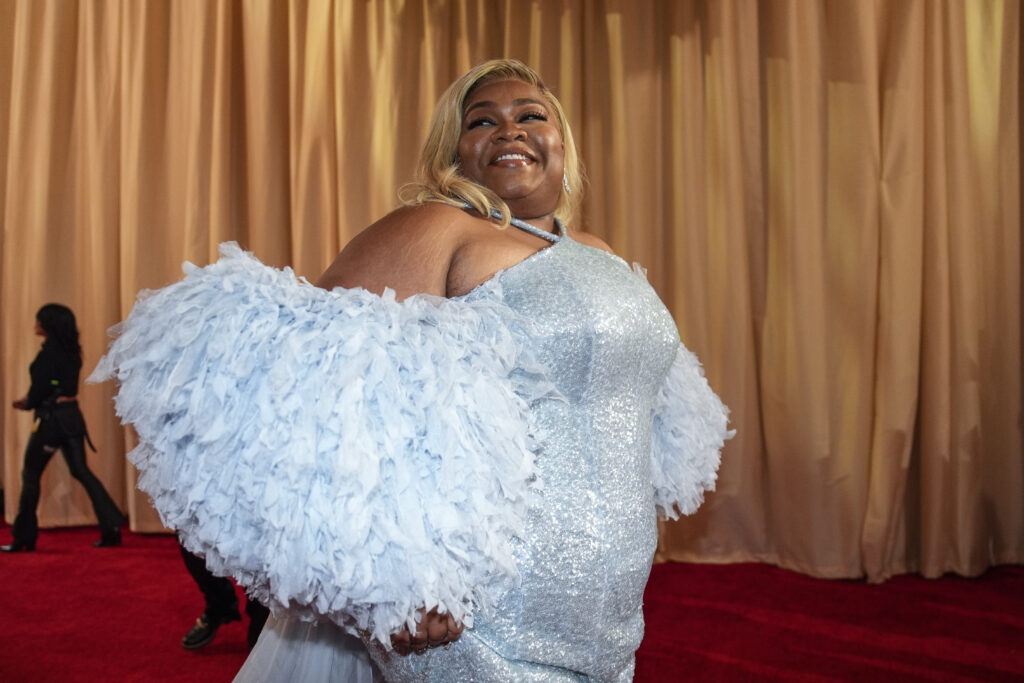
Randolph won the Oscar for Best Actress in a Supporting Role. It was her first Oscar nomination. In the Focus Features comedy/drama “The Holdovers,” set in the early 1970s, Randolph portrays the sassy but compassionate Mary Lamb, the chief cook at an elite boarding school in the Boston area. Mary is grieving over the death of her military son in the Vietnam War, and she is one of the few of the school’s employees who has to work during the Christmas holiday break.
Randolph’s Oscar win (the only Academy Award for “The Holdovers”) is part of her fantastic winning streak for “The Holdovers” that has made her the most-awarded movie actress of this awards season. Leading up to the Oscars this year, she won prizes at every major awards show that has movie categories, including the Golden Globe Awards, the Critics Choice Awards, the British Academy of Film and Television Arts (BAFTA) Awards, the Screen Actors Guild Awards, and the Film Independent Spirit Awards.
Randolph shed tears in her acceptance speech, marking one of the most moving moments of the ceremony.
“God is so good,” Randolph said. “I didn’t think I was supposed to be doing this as a career. I started off as a singer. My mother said to me, ‘Go across that street to that theater department. There’s something for you there.’ And I thank my mother for doing that.”
Randolph added, “Thank you to all the people who have stepped in my path and been there for me, who have ushered me and guided me. I am so grateful to all of you beautiful people out here. For so long, I wanted to be different. And now, I realize I just have to be myself. And I thank you for seeing me.”
Randolph, a graduate of the David Geffen School of Drama at Yale, also gave a shout-out to drama Prof. Ron Van Lieu.
“I thank you,” she said. “When I was the only Black girl in that class, when you saw me, and you told me I was enough. And when I told you, ‘I don’t see myself.’ And you said, ‘That’s fine. We’re going to forge our own path. You’re going to lay a trail a for yourself.’”
Randolph ended her acceptance with thanks to her publicist, saying, “You have been by my side throughout the entire thing. I am forever grateful. I pray to God that I get to do this [win an Oscar] more than once. I thank you for seeing me.”
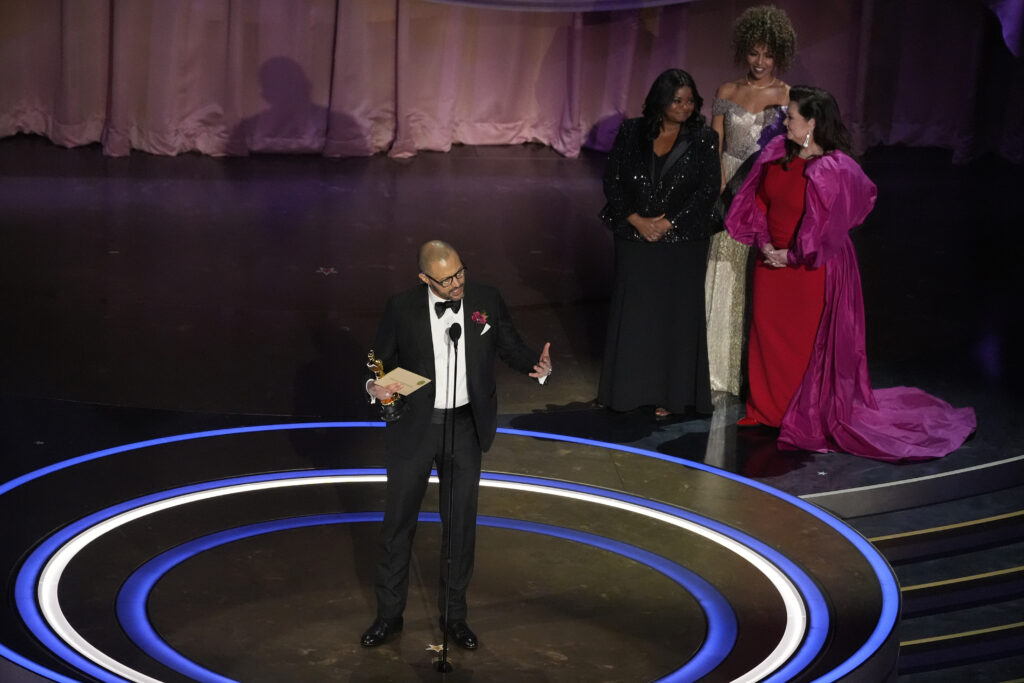
Cord Jefferson made his feature-film debut by writing, directing, and producing Orion Pictures’ comedy/drama “American Fiction,” which is based on Percival Everett’s 2001 novel “Erasure.” Jefferson won the Oscar for Best Adapted Screenplay.
In his acceptance speech, Jefferson made a plea for the public to be mindful that the project was rejected by almost every major studio and streaming service, but he was ultimately given a chance by people who could help.
“I’ve been talking a lot about how many people passed on this movie,” he said. “I worry that sounds vindictive. I’m not a vindictive person anymore.”
Jefferson continued, “It’s more of a plea … to recognize and acknowledge that there are so many people out there who want the opportunity that I was given. I understand that this is a risk-averse industry. I get it. But $200 million movies are a risk. It doesn’t always work out, but you take the risk anyway. Instead of making one $200 million movie, try making 10 $20 million movies or 50 $4 million movies.”
He ended his speech by saying: “I felt so much joy making this movie, and I want other people to experience that joy. They are out there, I promise you. … Thank you for trusting a 40-year-old Black guy who has never directed anything before. It has changed my life. I love you all.”
“American Fiction” was the Black-oriented film with the most Oscar nominations (five) this year. In addition to getting a nod for Best Adapted Screenplay, the film was nominated for Best Picture, with Black producers Jefferson and Jermaine Johnson as two of the four nominated “American Fiction” producers in this category. The other “American Fiction” nominations were Best Actor in a Leading Role (for Jeffrey Wright); Best Actor in a Supporting Role (for Sterling K. Brown); and Best Original Score (for Laura Karpman, who is white). All of the “American Fiction” nominees were first-time Oscar nominees.
“American Fiction” is about a literature professor named Thelonius “Monk” Ellison (played by Wright), who invents a persona of a fugitive criminal who’s written a novel that has negative racial stereotypes about Black people. When the book becomes a hit, Monk has to decide how much longer he can keep up the charade. Monk also deals with family issues, including sibling rivalry with his younger brother, Clifford “Cliff” Ellison (played by Sterling K. Brown), a plastic surgeon whose wife divorced him when she learned he was gay.
Before heading to the Oscars, Jefferson had already won several screenplay prizes for “American Fiction” at major awards shows, such as the Critics Choice Awards, the BAFTA Awards, and the Film Independent Spirit Awards. Jefferson is a former journalist who has also gotten accolades for TV screenwriting, including an Emmy Award for HBO’s 2019 superhero limited series “Watchmen.”
In his Oscar acceptance speech, Jefferson started off by thanking the Academy and “everyone who worked on the film.”
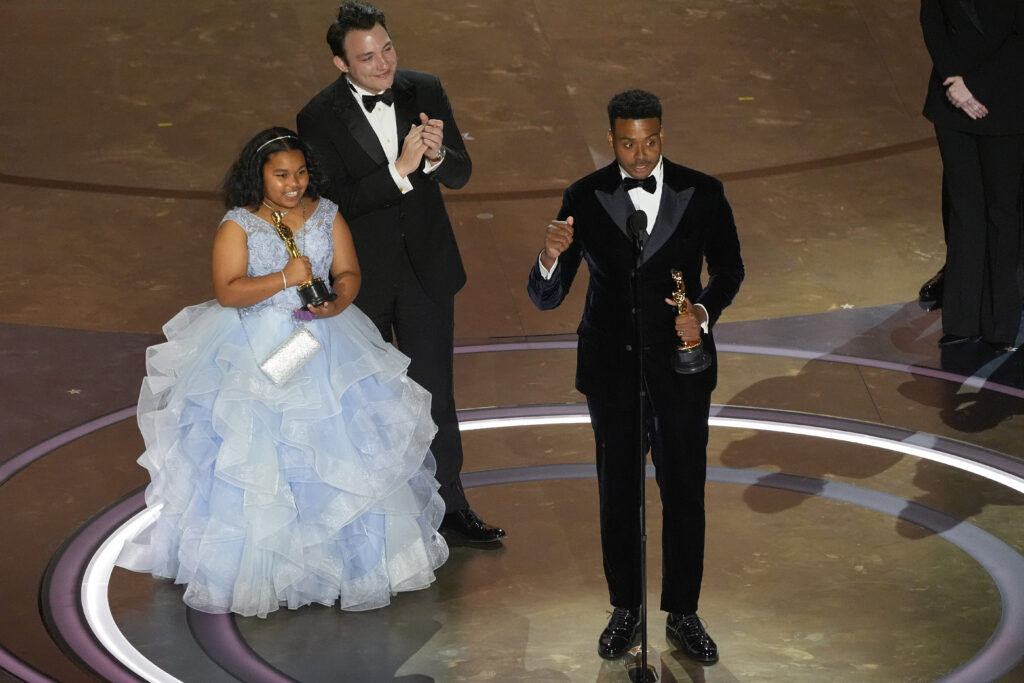
Bowers won the Oscar for Best Documentary Short Film, for co-directing and producing “The Last Repair Shop” with filmmaking partner Ben Proudfoot, who is white. “The Last Repair Shop” (from The Los Angeles Times and Searchlight Pictures) is a profile of a workshop in Los Angeles that repairs musical instruments for the Los Angeles Unified School District. Bowers’ previous Oscar nomination was in the same category, for 2021’s “A Concerto Is a Conversation,” which Bowers also directed and produced with Proudfoot.
Bowers won his first Oscar as a director/producer, but he does most of his work in the film industry as a composer. He composed the music for several movies released in 2023, including Warner Bros. Pictures’ musical “The Color Purple,” Neon’s drama “Origin,” Walt Disney Pictures’ horror comedy “Haunted Mansion,” and Searchlight Pictures’ biopic “Chevalier.” Bowers is also the composer for Paramount Pictures’ biopic “Bob Marley: One Love,” which is one of the biggest hits in the first quarter of 2024.
In his acceptance speech, Bowers said, “’The Last Repair Shop’ is about the heroes in our schools who often go unsung, un-thanked, and unseen. Tonight, you are sung, you are thanked, you are seen. Thank you all so much for what you do.”
Bowers continued, “John Williams inspired me to become a composer. He went to L.A. public schools. I went to L.A. public schools. … L.A. is one of the last cities in America to give students free and repaired instruments. We need to fix that, because music education isn’t about just creating incredible musicians. It’s about creating incredible humans.” He also thanked several colleagues, his family members, and 12-year-old Porsche Brinker, one of the students featured in “The Last Repair Shop,” who accompanied Bowers and Proudfoot on stage during the acceptance speech.
Backstage in the press room, Oscar winners Randolph and Jefferson shared more of their thoughts in separate press conferences.
When asked how being an award-winning actress has affected her mental health, Randolph replied, “I think you’d be selling yourself short if you make [acting] about the awards. It’s too hard of a career. The beautiful thing and the hard thing about being an actor is that it requires you to have resilience and self-confidence and belief in yourself when no one else does. When you’re constantly getting ‘nos’ and you’re saying, ‘Nope, I’m going to keep going.’”
She continued, “So actually, in many ways, although [acting] can challenge your mental health, it also can strengthen it, because you have to fortify yourself in a way that some people never, ever have to do. So for that, I’m grateful. Keep yourself grounded, surrounded by people who care and love you, and stay close to what’s real.”
As for what has stood out for her the most during her first awards season as a major contender, Randolph said: “I think the biggest thing has been the camaraderie. I didn’t know what to expect. I didn’t know if it was going to be a dog-eat-dog thing. I didn’t know if it was going to be really aggressive. And what’s been so beautiful is having this relationship with people who are going through the same thing with you, a support system you can rely on, and the friends that I’ve made because of it.”
Randolph also shared her view on how she “pays it forward” for Black representation.
“It’s imperative, because the people who’ve done it before me allow me to be in this position now,” she said. “And so, the type of work I do, my strive for authenticity, for quality, allows there to be a new standard set, where we can tell universal stories in Black and Brown bodies, and it can be accepted and enjoyed amongst the masses. It’s not just Black TV or Black movies for Black people. But instead, it’s a universal performance that can be enjoyed by all.”
She added that her role of Mary in “The Holdovers” was a “love letter to all Black women,” and she drew from influences such as her grandmother, Phyllis Hyman, and the TV comedy series “The Jeffersons.”
As for her advice to creative people in underrepresented communities, she said, “The beautiful thing that erupts is your imagination and your creativity. … That’s a gift. And that’s something that will serve you so that when you do have the resources, it’s easy. Something that I think we as Black people are very good at is making a lot out of very little. That’s a superpower, and I think we should applaud ourselves for it and uplift ourselves, so there’s nothing that’s never too little. It’s always just enough.”
Jefferson commented on how “American Fiction” pointed out and poked fun at stereotypes of Black people: “There’s a Victor Hugo quote: ‘Nothing is more powerful than an idea whose time has come.’ I was very passionate about this film. Everybody who worked on this film was very passionate about it. Nobody was there for the [big-budget] money because we didn’t have any [big-budget] money. People were there because they believed in it. To be here now, and to receive this kind of response, it feels incredibly surreal. I’m so grateful for it … We didn’t have a huge marketing budget, so we relied on word of mouth a lot.”
Jefferson continued, “Hopefully, the lesson here—kind of what I tried to convey in my speech—is that there’s an audience for things that are different. There is an appetite for things that are different. A story with Black characters that’s going to appeal to a lot of people doesn’t need to take place on a plantation, doesn’t need to take place in the projects, doesn’t need to have drug dealers in it, doesn’t need to have gang members in it. There’s an audience for different depictions of people’s lives. There is a market for depictions of Black life that are as broad and as deep as any other depictions of people’s lives.”
When asked to comment on how “American Fiction” showed different sides to Boston, such as upper-middle-class Black people, Jefferson said, “I think it’s important to show diversity within diversity. Some people think diversity means you have one Black guy in the room, and that gives you the totality of the Black experience. And, to me, it’s important to recognize that no one Black person contains the totality of the Black experience.”
Jefferson added, “You have people in the projects, of course. You have people who were slaves, of course. But you have the pole of being a slave, and you have the pole of being president of the United States. That’s part of the Black experience in this country. And you have millions of stories in between those two poles.”
Unlike some past Oscar ceremonies, this year’s Academy Awards had no major controversies, and the scheduled three-and-a-half-hour show ended on time. Oscar host Kimmel kept his on-stage banter and jokes lighthearted. David Alan Grier was the show’s announcer. Rickey Minor was the ceremony’s musical director/orchestra conductor.
A complete list of winners can be found at the official Academy Awards website.



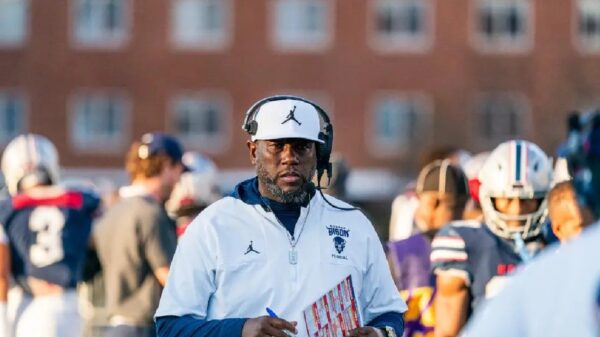

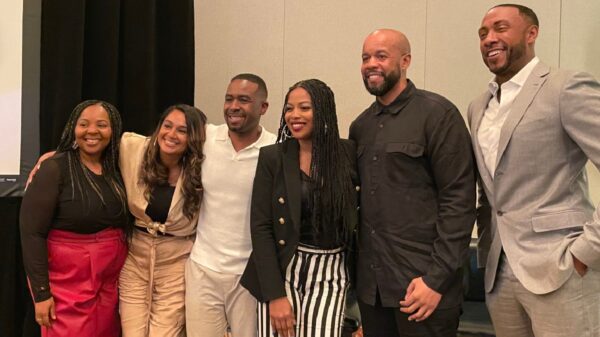



You must be logged in to post a comment Login